Junior League Announce Volunteer Service Awards
- Details
- Written by Joanne Wallenstein
- Hits: 4984
From L to R: Kaitlin Cardon, Alisa Choubay, Claire Teahan, Julie King, Lauren Wyler Smith, Melissa Preudhomme, and Rachel Underweiser Not pictured - Morgan Rappe 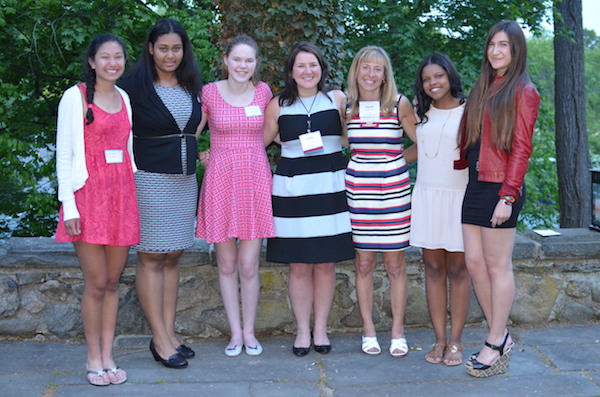
These winners are more than volunteers; they are visionaries, dreamers and leaders. After observing community problems, these young women acted quickly to make real and lasting positive change. Highlights from the volunteer work of our six recipients are:
Monetary Awards:
Alisa Choubay from White Plains High School volunteers with the Westchester County Youth Council where she leads in promoting civic engagement among local youth. Additionally, she serves as a Youth Judge and manages some court proceedings at the White Plains Youth Court, an alternatives-to-incarceration program that adjudicates misdemeanor cases involving juveniles.
Rachel Underweiser from Scarsdale High School created a weekly after-school theater program at P.S. 75 in New York City for students grades 3-5 when she learned that their arts funding was cut. Leading the weekly drama class she educates the young girls on leadership skills and self-esteem as they create their own sense of community and trust. In addition, she created the Red Cross Club at Scarsdale High School, raising money and taking action to help people in local disasters, and is a Civic Education Advisor.
Kaitlin Cardon from White Plains High School started and leads Girl Talk in White Plains, a chapter of the national organization in which high school girls mentor middle school girls with a focus on empowering girls to handle the myriad of problems young women face. She also volunteers with St. Bernard's Youth Group and the Westchester Coalition for Drug and Alcohol Free Youth.
Recognition Awards:
Morgan Rappe from Edgemont High School established the "Edgemont Students Supporting our Military" club. With a huge membership base, they fundraise and send care packages and letters to show appreciation for our troops abroad. Their club also donates to The Wounded Warrior Project and The Fisher House Foundation, and the members volunteer at local VA hospitals. She is also a Peer Leader and student advocate.
Claire Teahan from Eastchester High School created The Eagle Impact program using the school mascot to unite athletes' sense of teamwork with community service. The program established food drives at athletic games and collected letters to soldiers from their athletes. In addition, the program recruited a team of athletes to volunteer as coaches for a special needs after-school athletic program at one of their elementary schools and led a fundraising campaign to purchase team apparel for the special needs golf team.
Melissa Preudhomme from White Plains High School is President of Midnight Run Club at White Plains, an organization that goes into Manhattan monthly providing food and clothes to the homeless. She also organized a Midnight Run Sleep Out, in which 20 students slept outside in cardboard boxes and raised money for a local food pantry and shelter. In addition, she volunteers with the student General Organization.
Five Things You Need to Know When Selecting a College
- Details
- Written by Megan Shelton
- Hits: 5413
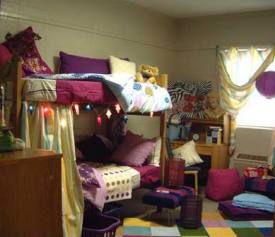 SHS alumni returned to Scarsdale High School on Thursday night May 29 to share the inside scoop on the colleges and universities they attend with high school juniors who are now immersed in the process of deciding where to apply. Tables in the cafeteria were set up by school, giving high school juniors the chance to meet with college students to discuss questions they might not feel comfortable asking an admissions officer.
SHS alumni returned to Scarsdale High School on Thursday night May 29 to share the inside scoop on the colleges and universities they attend with high school juniors who are now immersed in the process of deciding where to apply. Tables in the cafeteria were set up by school, giving high school juniors the chance to meet with college students to discuss questions they might not feel comfortable asking an admissions officer.
Ultimately, the feedback was great. A lot of the juniors were quite happy to see some old friends who had gone off to college, and the juniors unanimously agreed that this night was interesting and fun. Junior Nicole Stapleton had a lot to say about her student to student night experience: "I thought it was pretty informative. It wasn't heavy on statistics or scores regarding the admissions at each school because we were talking to students and not admissions officers. The information given was more about the student experience at each school. A lot of my friends went as well so it was also interesting to see which schools interested them. It was also really nice in that I got a better idea of student life at each of the schools I am looking at."
There was quite a large selection of colleges at student-to-student night including Tufts, Bucknell, Oberlin, Bowdoin, Vanderbilt, Tulane, University of WisconsinMadison, New York University, Georgetown, and SUNY Binghamton. Obviously not every school in the country was represented, but the range of different types of colleges that were represented was large. The majority of the students were extremely satisfied with the variety.
Commenting on the night, Adrienne Travis said, "For me the student to student night went really well. I found it interesting to learn how happy all of the students were at their respective schools and how strongly they advocated for their schools to the juniors. Everyone was willing to answer my questions whether it involved academics, living conditions, or even food. I loved hearing about all of the successes Scarsdale alums have had and how, despite living apart for so long at different schools, when they were all back together in the high school, it was almost as if high school hadn't ended for them. I learned a lot about several schools I was interested in, especially Tufts, where I got the sense that no matter who you are there is a place for you and that you are capable of prospering there."
Though each school is surely unique in its own way, I noticed that the questions people were asking were pretty consistent from table to table. What kinds of things should you know about? What should you be thinking about? For incoming juniors (and possibly sophomores), here is a list of questions (in no particular order) to answer before finalizing your college list:
1. What is the social life at the school? What do people do for fun?
Though your parents may relentlessly remind you that you're going to college to get a higher education and not to "party hearty," learning about the social scene at any given school is extremely important. If you aren't interested in participating in Greek life, why go to a school where students say it's hard to have a social life if you aren't in a fraternity or a sorority?
2. How is the food?
Since I live off of salad and frozen yogurt, this question is important to me. I've visited a couple schools that did not appear to have appetizing food options, which made these schools extremely unappealing to me. If current students agree that campus food is barely edible, then ask a followup question about food options offcampus and find out whether or not you can swipe a meal card at these other places.
3. Is it safe to walk around campus at night?
Living in Scarsdale, I feel pretty safe walking around day or night and know that wherever I go to college I want to feel just as safe. You should never feel scared to go anywhere on campus. Be sure to ask if there is a blue light system (a telephone linked directly to the campus police) on campus. Most colleges have blue light systems, but not all do. By having a blue light system, colleges are showing potential students that they really care about their students' safety. If you know that students feel safe when walking around campus, not only will it help ease your nerves, but it will reassure to your parents as well.
4. How's the weather?
Since I have lived in New York my entire life, sometimes I forget that weather varies by state, and the temperature could have a big effect on your state of mind.
5. How are the dorms?
You should definitely consider the living accommodations at schools on your list.
Are the dorms nice or are they barely livable? When visiting a dorm room see if the room can comfortably hold two or even three students. Ask students who attend the school what a typical dorm room looks like if the ones shown on the tour appear to be staged for the tour.
 Contributor Megan Shelton is a junior at Scarsdale High School and loves her honors English class. Megan spends her free time writing, reading, exercising, hanging out with friends, and doing work for the Epilepsy Foundation Club, the American Red Cross Club, and the Juvenile Diabetes Research Foundation Club.
Contributor Megan Shelton is a junior at Scarsdale High School and loves her honors English class. Megan spends her free time writing, reading, exercising, hanging out with friends, and doing work for the Epilepsy Foundation Club, the American Red Cross Club, and the Juvenile Diabetes Research Foundation Club.
What I Learned on College Night
- Details
- Written by Megan Shelton
- Hits: 5127
 While some of my friends said they didn't find out anything new about college admissions at Scarsdale High School's Annual College Night on May 15, reflecting on what I heard, I was reminded of some important information. Admissions counselors from Tufts University; Ursinus College; SUNY Binghamton; Sacred Heart University; Hamilton College; Yale University; Indiana University, Bloomington; Washington University in St. Louis; and University of Rochester came to talk to parents and students about standardized testing; essays and supplements; resumes; and many other aspects of the college admissions process.
While some of my friends said they didn't find out anything new about college admissions at Scarsdale High School's Annual College Night on May 15, reflecting on what I heard, I was reminded of some important information. Admissions counselors from Tufts University; Ursinus College; SUNY Binghamton; Sacred Heart University; Hamilton College; Yale University; Indiana University, Bloomington; Washington University in St. Louis; and University of Rochester came to talk to parents and students about standardized testing; essays and supplements; resumes; and many other aspects of the college admissions process.
Since not everyone is fortunate enough to visit every college to which they want to apply, it was good to have the admissions officers come to us and consolidate much of what we needed to know into a one-night session.
So even though you may feel you know everything, it is nice to have it all reiterated to you by the people that matter most ... the admissions officers who have the final say. Here is a list of some important aspects of what the admissions counselors (re)taught the audience at College Night ... Attention juniors who couldn't make it, parents who want to offer some advice to your sons and daughters, and underclassmen who are looking ahead to college:
1. You are NOT your test scores. This cannot be emphasized enough, especially in Scarsdale where there pressure to get high scores, and peer pressure to equal or better your friends test performance. The admissions counselors understand that on any given day the test might have been especially hard or the flu might have been going around. However, they also know that there are many great things about you that make up for "bad" test scores.
2. College admissions offices love seeing upward trends on your standardized tests and on your transcript. Junior year is the last full year that your grades truly matter, so focus on keeping your grades high throughout the year.
3. For all the athletes out there: if you are being recruited to a school (or hope to be recruited) make sure you spend as much time talking to the schools' admissions office as you do with the coaches. While a college coach may like you and advocate for your admission to the school, the Admissions Office not the Athletics Department has the final say regarding your acceptance.
4. We all know that extra-curriculars are a major aspect of your resume, but most colleges value your participation in just one club in which you hold a major position rather than seven different clubs in which you have no ranking and minimal participation. Your years in high school give you time to pursue your interests, so find what it is that you enjoy doing and stick with it.
5. Your essay can make or break your admission to a college. When writing your essay, be as creative as you wish, but be sure that it has underlying meaning. Also keep in mind that you never know who will be reading your essay so make it appealing to a wide range of readers.
6. If a college offers evaluative interviews and you feel that you are personable schedule one. Interviews are a great way for an admissions counselor or a representative from the college (alumni, etc.) to get to know you off paper.
7. When picking what colleges you want to apply to, remember to keep an open mind you may be surprised.
8. Visit as many college campuses as you can. Seeing a college and the people who attend it as well as the clubs and programs offered there is a totally different experience from reading about the college in a guide. At some (but not many) colleges, such as Sacred Heart University, you cannot even apply unless you have visited the campus, so keep this in mind. While most colleges are very forgiving and will not usually count it against you if you did not have the opportunity to visit (if it is far away, etc.), schools you apply to that are much closer (for example Hamilton, since Hamilton's representative specifically mentioned this fact) would definitely prefer if you visited.
And finally...
9. Remember to take time to de-stress from this pressured process. Junior year is undoubtedly a tough one, but it is important to allow yourself to take some time to forget the stress and relax.
While I am only a junior in high school and definitely not an expert, I have learned a lot this year regarding the college process through researching the schools, attending college panels and visiting to a significant number of campuses. I hope this advice helps. Good luck in your search.
Megan Shelton is a junior at Scarsdale High School who loves to write. She spends her free time writing, reading, exercising, hanging out with friends, and doing work for the Epilepsy Foundation Club, the American Red Cross Club and the Juvenile Diabetes Research Foundation Club.
Junior Olympics: A Welcome Reprieve
- Details
- Written by Krsna Kay
- Hits: 5828
Bryant Lo and Marisa Wong posing in their Fox Meadow Elementary School T-shirts. 
School Psychologist and Junior Class Advisor Ernie Collabolletta, who organized the day with Jessica Levenberg said, "The announcement came at 11:45 and the juniors were summoned to group with their elementary school buddies. By 12:30 over 350 juniors met on the Brewster Road side of the school and the games began. Teams were involved in dodge ball and kick ball. While these teams were battling all different types of relay races such as three legged races, wheel barrel races, balloon toss, pie eating, and tug of war. In the end, Fox Meadow outperformed their elementary school rivals with Quaker Ridge following behind them.The Junior class had a wonderful competing yet bonding with each other.
A parent of a high school junior said, "I am glad the juniors had a fun break from all the pressure this time of year. There is so much testing particularly for them over the next couple of weeks. This class seems to know how to take a break and just have fun." Juniors show their elementary school spirit for Junior Olympics on a sweltering Tuesday afternoon. Lea Trauzzi leaps over her teammate in the Leap Frog race Juniors cool off before Tug of War, the final event, begins. (From left to right) Julia Klein, Ally Yaseen, Deepthi John, Caroline Teicher and Oliver Verzani display their elementary school pride with face paint and customized shirts. (From left to right) Alan Zhong, Caroline Teicher, and Anil Sindhwani enjoying their day of fun events, school spirit and friendly competition. Leapfrog race on the turf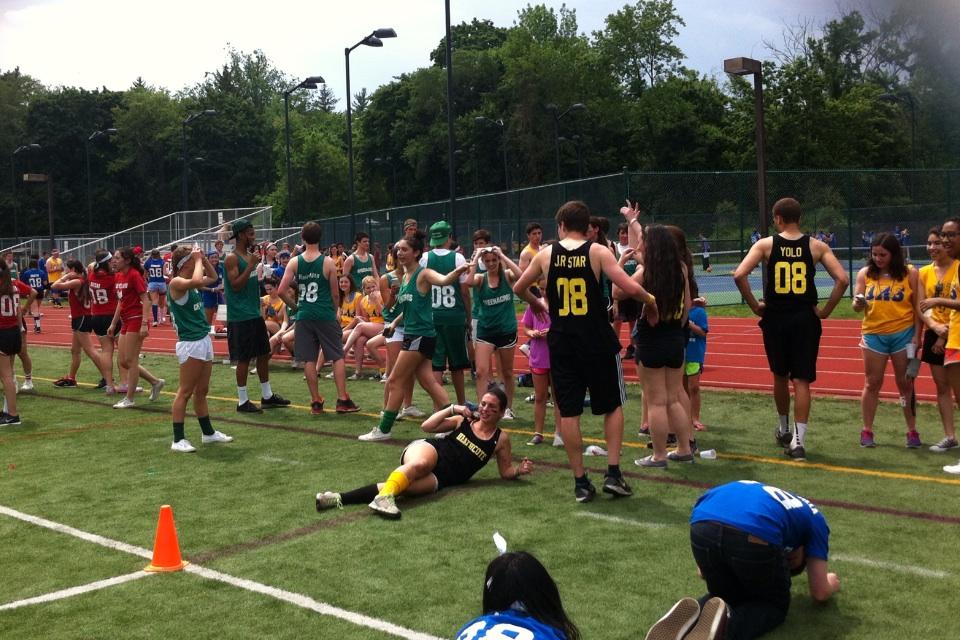
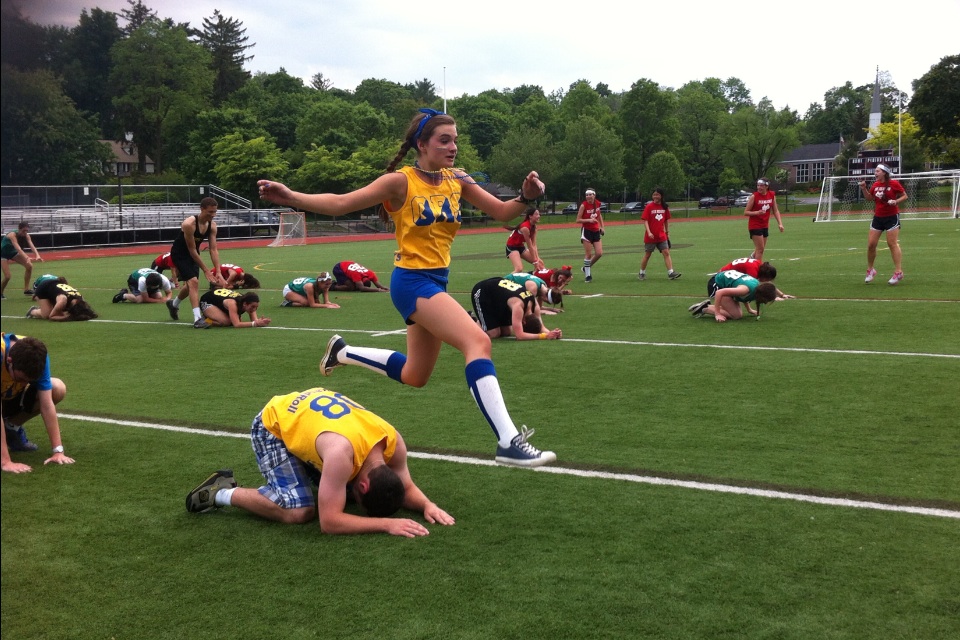
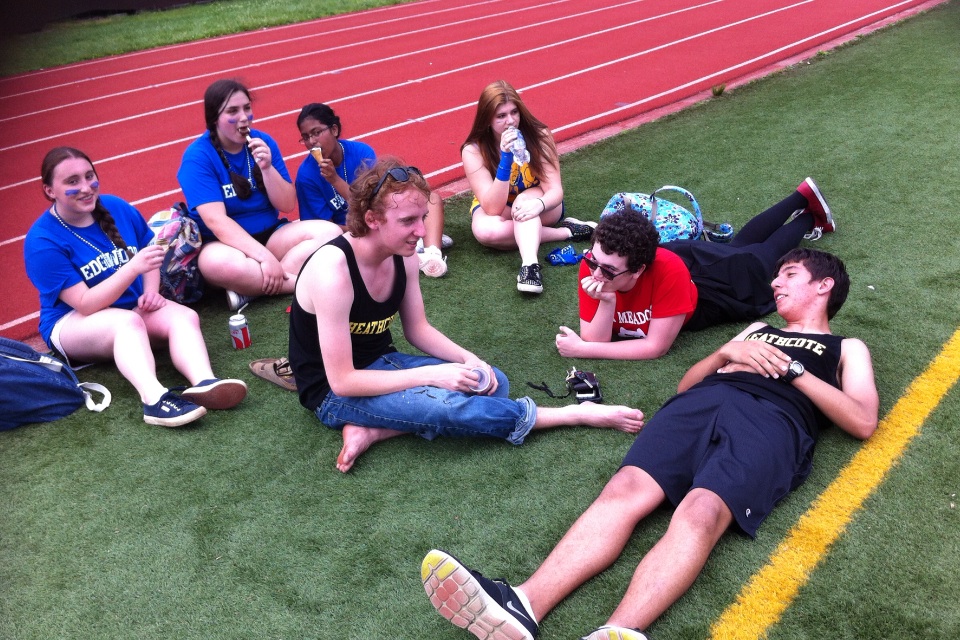


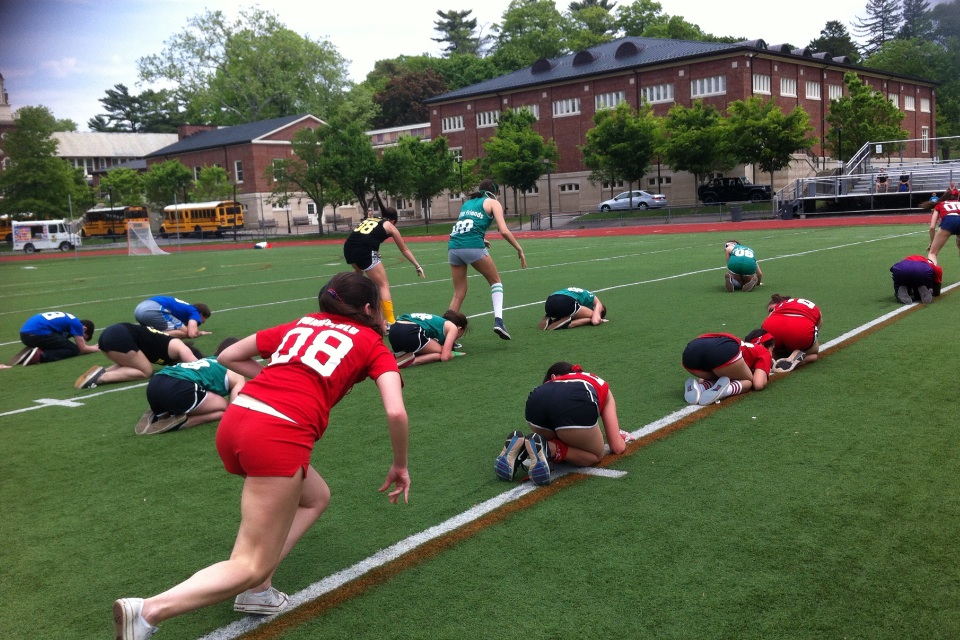
: Juniors crowd around the ice cream truck after a sweltering 3 hour celebration of the end of junior year and the beginning of summer
The Grumpy Teen: Navigating Your Way Around Your Testy Adolescent
- Details
- Written by Stacie M. Waldman
- Hits: 12229
 If you've ever felt like your teen was allergic to you, you'll be relieved to know that's normal. That's what a large crowd of parents learned on Thursday May 8 when they came to SMS to listen to clinical psychologist Dr. Anthony E. Wolf speak about the challenges of raising teens. Wolf should know because he is the father of two ex-teenagers and has spent a lifetime examining the psychology of children and teens. He earned a Ph.D. in Clinical Psychology from City University of New York followed by twenty-five years in
private practice, where he sees children and adolescents. He is the author of five books on parenting and numerous articles for Child Magazine, Parents, and Family Circle and currently writes a column for the Toronto Globe and Mail. Dr. Wolf has appeared on The Today Show, Fox Morning News, CBS Morning News, and The View as a teen psychology expert.
If you've ever felt like your teen was allergic to you, you'll be relieved to know that's normal. That's what a large crowd of parents learned on Thursday May 8 when they came to SMS to listen to clinical psychologist Dr. Anthony E. Wolf speak about the challenges of raising teens. Wolf should know because he is the father of two ex-teenagers and has spent a lifetime examining the psychology of children and teens. He earned a Ph.D. in Clinical Psychology from City University of New York followed by twenty-five years in
private practice, where he sees children and adolescents. He is the author of five books on parenting and numerous articles for Child Magazine, Parents, and Family Circle and currently writes a column for the Toronto Globe and Mail. Dr. Wolf has appeared on The Today Show, Fox Morning News, CBS Morning News, and The View as a teen psychology expert.
"It is a very humbling experience to be the parent of a teenager," says Wolf. It's psychologically normal for adolescents to essentially develop an 'allergy' to one of both of their parents." He continued by saying, "There is a historic change in the behavior of children with their parents. They talk back more," he added, "and are not as immediately obedient. Kids today do not respect their parents in the way they did in the past." So why is this happening? According to Wolf, kids today are more outspoken because parents are doing something right... by no longer using physical punishment to discipline their children. "The revolution in parenting today is that parents can no longer physically punish their children without potential repercussions; it's no longer acceptable. " According to Dr. Wolf, by the time kids are adolescents, they know this and it makes them less afraid of their parents. Dr. Wolf believes that parenting is truly more difficult today than in the past.
Next, Dr. Wolf gave the example of the "at home versus at school" teenager. Do you have a child that is a nightmare at home but an utter joy and delight to others once they leave the house, including at school? Do you have a child who could fight for two hours about taking out the garbage at home and then steps up to whatever is asked at her friends house?
Dr. Wolf described this phenomenon as the two different versions we all have of ourselves- the home version (or "baby self") and the outside version (or "mature self"). While the baby self at home cannot handle delayed gratification or stress, outside, the mature self can handle much more stress. "In some families," Dr. Wolf cautioned, "the parent who does all the day to day care of the child gets the baby self, and the other parent gets the mature self." He also added, "Parents can say the same exact thing and get very different results." Adults often have a baby self, too. For example, when the kids go to bed, adults often shut down and morph into their own baby selves. This is why it is so stressful when kids get out of bed numerous times after being put to bed- we feel like we're "done."
"Would you prefer that baby self come out at home or at school?" Dr. Wolf asked the audience. He quickly pointed out that, "...you can't choose this. The simple act of a parent being present brings out the child's baby self, i.e. the whining, complaining, and noncompliance."
Can you reduce the amount of fussing in your child? Dr. Wolf said yes. "Baby selves don't want stress and want everything now. When they don't get their way, baby selves will go on and on for a very long time- they can't move forward," he said. Dr. Wolf's solution to this is to tell your teen what you have to say in a fast and firm way, and then "RUN! Literally, just disengage as soon as you feel your blood pressure rising." That being said, Dr. Wolf forewarned, it's also important to choose your battles wisely.
How and why do you disengage? "Disengage by saying what you have to say and then stop," said Dr. Wolf. "Anything more is provoking and is not good for the baby self. What baby selves hate more than anything is to separate or walk away." He suggests shutting the argument down as soon as possible even if your teen calls you a nasty word. "At some point, you need to address this," he said, "but do NOT do it at this time." He argues that if you want less of the talking back, this is what will work. "Use this technique and stay consistent with it," he advises.
Dr. Wolf described adolescence as the coming together of four developmental changes at the same time: physical, intellectual, sexual, and the need for independence, "...all of which make this time a struggle." According to Dr. Wolf, teenage boys often remove themselves from family life and it can feel like a wall has descended on their parents.
Teenage girls tend to declare their independence. The climate with teenage girls is usually tenser than with boys, but Dr. Wolf said research shows that girls can be more psychologically healthy as teenagers than boys. "Boys tend to become non-communicative which is worse in many ways--- they can completely shut down," he said, "which can be worrisome."
Dr. Wolf's suggestion for day-to-day teenage grumpiness? "Joke around with them," he said. "Just be goofy and silly sometimes instead of getting mad." And always, always hug them, he added, even if they act like they hate it. "
Dr. Wolf then answered audience questions:
When my teen's "baby self" is banging at the door after I've disengaged, I feel like that brings out my own baby self. What should I do?
Continue to completely disengage.
How do you explain disengaging one child to other siblings?
That's a tough one. Don't try to justify yourself. Just say it's what you're choosing to do with that particular child at that particular moment.
Boys really do seem to shut down. How can you tell the difference between a depressed and a non-communicative, grumpy teen?
Go with you own instincts and if it continues for a long time, seek professional help.
Do teenage girls tend to have a stronger "allergy" to their mothers versus their fathers?
The short answer is YES.
What about teenage sibling rivalry? Can you teach them to disengage each other?
When a parent disengages, some teens learn to provoke a sibling.
Do you recommend going back and talking to your child after disengagement?
Yes, but wait until things are calm to discuss it.
Are there any general rules for tolerating the baby self?
If grades fall or your teen seems miserable or has no friends, that's a red flag. If a worry persists beyond moodiness, seek professional help.
According to Dr. Wolf, "...the best indicator of what child will be like when they grow up is the mature self. Don't look at one slice of your child's life," he warned. "If you're a nice and nurturing parent and take a firm stance at least some of the time --even though your children gets mad at you, the odds are strongly in your favor that your kids will turn out okay." And teens aren't teens












